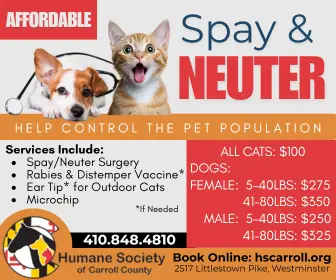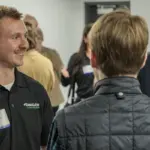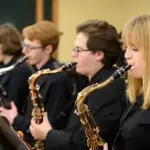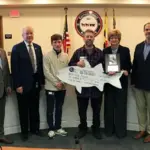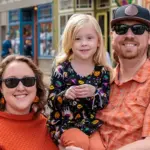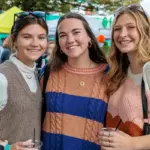by Kym Byrnes, photography by Nikola Tzenov
Billy Lyve’s journey is one of resilience, passion and purpose.
Raised in Carroll County, he experienced a challenging upbringing, often feeling unheard and turning to the streets to find community. Music became his lifeline, and through determination, he made a name for himself as a hip-hop artist across the DMV. Becoming a young father pushed him to find his way. He launched Wisdom Court Entertainment and later Find Your Purpose — an organization helping kids facing struggles like his own. Today, Lyve has earned honors like the Community Foundation’s Rising Star Award, the Carroll County Public Library’s Cultural Literacy Award and a spot on The Baltimore Sun’s “25 Black Marylanders to Watch.” His story proves that the rose can grow through cracks in the concrete — purpose can rise from even the most insurmountable circumstances.
What was life like for you growing up?
I lived in Reisterstown, Sykesville and Westminster. Growing up, I always felt misunderstood — pushed to the side. No one paid attention to me when I was in school. I grew up rough. We were poor. There was alcoholism and violence in my household. I was dealing with pressures in school and at home, so my release was to go outside and get in trouble on the streets to deal with emotions that were bottled up inside me.
When did you know you wanted hip-hop to be a part of your future?
When I was young, my brothers and I would hang out in the front yard, cooking out and breakdancing, with LL Cool J and Run-D.M.C. playing on a big boombox. I started out trying to sing, and that didn’t work out too well. When I moved to Carroll County, we created a band just goofing around, and as we got better, we moved into [performing] our own stuff. I started with a dream to become a superstar rapper, but as I got older, I recognized that we can have some part of stardom, but it’s OK if we don’t. I have built a reputation as an artist; I perform solo and with my band, iLL LuCK.
How has growing up in Carroll County influenced your music?
The tales that I’m telling are rooted right here in Carroll County. I’m serving as the voice of the voiceless in Carroll County. I look at myself as a spokesman for the unspoken for. Even though there are a lot of minorities here, they don’t feel like anyone is paying attention to them. It makes them feel like everyone is against them. I’ve been able to navigate that. If we walk into a room and value ourselves and respect other people, we can change things. I could have done my business and charitable work in Baltimore, but I stayed here because I can make a difference. There are a lot of Spanish-speaking and mixed kids in Carroll County. When I talk about minorities, I represent anyone who feels they don’t have a platform or a voice, not just race.
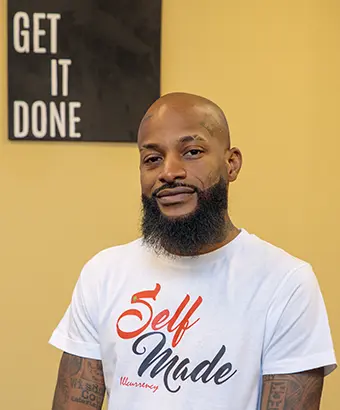 What’s a song you’ve written that means the most to you, and why?
What’s a song you’ve written that means the most to you, and why?
I wrote a song called “Freedom Writers.” It’s about writing to release whatever pressures you have and to feel free. When I get on stage, and I’m in front of thousands of people and rapping, it sounds good and people’s heads are rocking. That is one of the best feelings you can have as an artist. I’ve opened for some big artists, so I’ve gotten a chance to see what it’s like to be a superstar; I’m OK with not chasing that. I try my hardest as an artist. I’m not super famous, but people recognize me locally and nationally, and I’m OK with that.
What is Wisdom Court Entertainment?
Wisdom Court Entertainment is a business I created. We specialize in music entertainment — consulting, bookings, media, marketing and promotions. Nowadays, all marketing is done online. Back in the day, marketing meant people putting posters up to promote events and handing out flyers — personal interactions to get people hyped up for an event. I’ve brought that street-level marketing back. Companies hire us to do that kind of guerrilla marketing, and we’re constantly booked. We started as a record label and branched out into different areas.
What’s the biggest mistake independent artists make with marketing and promotion in today’s digital music landscape?
Artists get too lost in the internet and online marketing and forget how to be personable. When you want someone to follow you, you want people to be able to relate to you, to connect with you. Back in the day, there was no internet; all you had was music and maybe a magazine article. To be known and successful, those artists had to be out and about, doing shows and connecting with people. Now, people can drop 18 videos and not be out doing anything. It hurts local artists.
What motivated you to start the organization Finding Your Purpose?
When I was growing up, no one like me was trying to lead people in the right way. In fact, if they looked like me, they were probably leading kids down the wrong path. My mentors weren’t good. I had my son when I was young, and that changed the course of my life. I made the decision that I was going to be a good dad. As we both got older, I realized there were not a lot of active dads in his friend groups, and I decided I wanted to be a mentor to these kids.
I had established a reputation as an artist, and someone asked me to speak to a group of kids. I started working with kids to help them create music, learn the industry and record their work. Doing that inspired me to start Find Your Purpose. I want everything to be hip-hop; to me, Find Your Purpose is hip-hop. I was inspired when I started seeing kids become successful from the lessons I was giving them. I was inspired watching kids who look like me — when I say that, I don’t even mean the same color as me. They are the same on the inside: kids who felt left out and didn’t have anyone to look up to, who are now finding success and doing cool things, staying away from the criminal stuff.
You have acquired much recognition and accolades over the last few years. How do you handle the attention?
It always feels good to be acknowledged, and it suggests I’m doing something right. The shoutout by The Baltimore Sun — that motivated the hell out of me.


